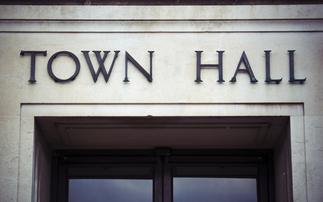Fabius: 'Compromise requires us to forget the ideal solution for everybody so we can get something desirable for everybody'
The Paris climate talks edged forward tonight with the release of a new negotiating text and a call for ministers to deliver a final agreement by tomorrow.
Following nearly 36 hours of round the clock negotiations, the French President of the talks, Laurent Fabius, brought together ministers this evening to unveil a new text ahead of a fresh round of group negotiations now expected to run through the night.
"It was a very long night of work, a very intense night" he said of Wednesday night's efforts. "I know that we all worked extremely hard. But I know that this allowed us to make progress."
He implored ministers to focus on delivering a compromise agreement which breaks the deadlock surrounding the various political issues in the text: differentiation between rich and poor nations, climate finance, loss and damage, and a long term target.
"Compromise requires us to forget the ideal solution for everybody so we can get something desirable for everybody," he said.
Countries were given two hours to consider the new text before being called back to discuss key issues in a series of group discussions, known as indabas.
Fabius urged groups to only focus on securing compromise positions in the text, labelling the process the "indaba of solutions", effectively warning against countries simply restating their positions and blocking progress towards a deal.
When talks became deadlocked, selected ministers would be invited to leave the room and return in 30 to 45 minutes with a solution. "This process will require your responsibility," he said.
The move follows complaints from some delegations that last night's negotiations were undermined by countries resisting attempts to come up with new compromise positions.
He also stressed that the French presidency remained committed to delivering an agreement tomorrow. "I think I will be able to present final text tomorrow," he said. "I think, dear friends, that we will make it."
The new text is 27 pages long and contains just 50 square brackets denoting on-going disagreements, down from 367 in yesterday's version.
However, observers said attempts to deliver a compromise had resulted in the watering down of a number of proposals from those countries pushing for an ambitious deal.
The proposal for a new 1.5C temperature goal has been modified to reflect concerns from some emerging economies that it will be near impossible to keep temperature increases below 1.5C. The new text commits countries to working to "hold the increase in the global average temperature to well below 2C above pre-industrial levels and to pursue efforts to limit the temperature increase to 1.5C, recognizing that this would significantly reduce risks and impacts of climate change".
Similarly, ministers pushing for a system of five year reviews might be forced to accept a more voluntary mechanism, with the new text only "inviting" countries to resubmit their INDC national climate action plans every five years. The UK and a number of other countries have been demanding the text require countries to review their INDCs every five years, even if they opted not to update them.
However, there appears to be something of a victory for those nations pushing for early action to review progress against national action plans, with the text committing countries to "take stock of the collective efforts of parties in 2019".
The text will also leave the EU and those environmental groups calling for a specific reference to aviation and shipping disappointed, as both industries remain excluded from the latest text, after it was dropped yesterday.
Attention will now turn to the overnight effort to reach agreement on the remaining options and square brackets, which again focus on the outstanding political issues of differentiation, climate finance, loss and damage, and overall ambition.
Crucially, the Marshall Islands' Tony de Brum, one of the driving forces behind the so-called High Ambition Coalition, broadly welcomed the new text. Writing on Twitter he said the text was"good attempt to work through some of the options toward finding landing zones".
He added that "recognition of the need to work to limiting warming to 1.5C means I'd be able to go home and & tell my ppl that our chance for survival isn't lost."
The new text received a cautious welcome from green business groups, who argued it retained many of the measures the low carbon economy requires to accelerate its development.
"Business thanks the French Presidency for its continued leadership of COP21," said Nigel Topping, CEO of the We Mean Business coalition of green business groups. "We ask you to stay strong in finalizing an ambitious climate agreement, which will send a catalytic signal to the real economy. We urge you to fulfill your promise to "leave nothing behind" - including the long-term goal and the five-year ambition mechanism, starting from 2020 onwards."
His comments were echoed by Stephanie Pfeifer, CEO of green investor group IIGCC, who said: "We welcome the latest draft agreement, in particular the long term goal, the five year review cycle and possible progress on climate finance. Investors came to Paris to showcase their many actions on climate risk and to call for a robust accord that will increase both the pace and scale of investment in all aspects of a cleaner low carbon energy system... As part of the immense and diverse coalition of non-state actors assembled in Paris, we encourage political leaders to secure the agreement we all know is essential."
PwC's Celine Herweijer said it was clear the "text is strengthening". "The deal now clearly calls for warming well below 2C, and effort to limit it to 1.5C," she added. "This is a bold step change in ambition and sets the tone for the scale of the low carbon transition needed. Finance has also progressed with $100bn a year now as a floor for finance raising. The hope might be that this would create the ripple effect needed to unlock agreement on the remaining contentious areas including differentiation, loss and damage and compliance. It's game on, but key areas like finance that look to have progressed could still change when parties reconvene tonight."
However, some green NGOs and development groups were left much less impressed by the new text. Martin Kaiser of Greenpeace said: "This thing isn't over until the conference closes, but what's on the table just isn't good enough. It's a very big problem that the emissions targets on the table will not keep us below 1.5 degrees of warming and this draft deal does absolutely nothing to change that. Right now we're witnessing a display of international impotence."
He also warned the text would not send sufficiently strong signals to investors. "Right now, if you were planning on investing in a new coal mine this deal might not be enough to make you put your chequebook away," he said. "The negotiators have got twenty-four hours to change that simple fact."
Lucy Cadena, Friends of the Earth International climate justice and energy coordinator, offered an even blunter assessment. "Rich countries have moved the goal posts so far that a just deal in Paris is inconceivable," she said. "If this text indicates what will be agreed here, we will be left with a deal that fails humanity. This text dismantles the core foundations of the UN climate convention. The pillars of a just agreement - ambition and equity - have been completely undermined. After all the warm words of developed countries on a 1.5 degree limit, the new text contains no obligation to stay under this threshold. Shockingly, the text could allow for carbon emissions to continue until 2099."
This article is part of BusinessGreen's Road to Paris hub, hosted in association with PwC.







